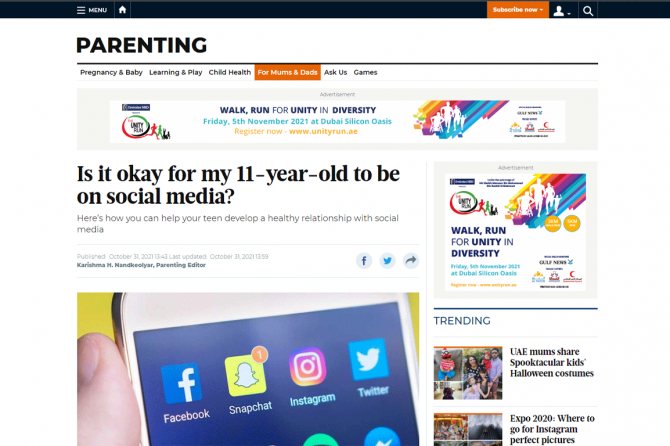
Is it okay for my 11-year-old to be on social media? – Dubai Psychologist, Dr. Lavina, in talks with Gulf News
We live with a digital generation, where messages replace calls, where posts on a timeline are worth 10 in the inbox. This is even truer for adolescents who’ve grown up with screens for company. And while the past year of the pandemic only strengthened that bond, it is imperative to gauge whether this relationship is healthy. […]
The most important question that presents itself here is: At what age is it okay for a child to begin using social media? The consensus points to age 13. Dr Lavina Ahuja, clinical psychologist at German Neuroscience Center, explains: “Most social media sites do not allow children to have an account prior to the age of 13. I agree with that minimum age as prior to 13 they might not have the cognitive and emotional awareness to manage the responsibility of a social media account.”
Teens are notoriously secretive, so what can a parent do to stay a part of their social media exchanges? Dr Ahuja suggests a relaxed approach. She says, talk to them about their social media – ask them if someone has posted something that made them think or made them smile or made them upset or uncomfortable (even if they don’t understand why). […]
“Teach them to be aware of the impact social media is having on them – do they compare themselves to others and does that make them feel bad about themselves? Having conversations with your teens and asking them questions to help with open communication can help parents stay part of their child’s social media exchanges,” she suggests
It’s also important to limit social media usage, as chasing ‘likes’ can be addictive. “Research shows that screen time, and especially mediums that provide instant rewards such as gaming or someone liking our social media posts increase dopamine levels in the brain. Dopamine is a neurotransmitter, which plays a role in how we experience pleasure, and it affects mood, movement, impulse control, attention and concentration. As dopamine is related to the rewards-centre of our brains and supports the reinforcement of enjoyable behaviours, it is often involved in addiction,” explained Cabrière Jordaan, Counselling Psychologist at German Neuroscience Center.
The full and original article was posted in Gulf News

